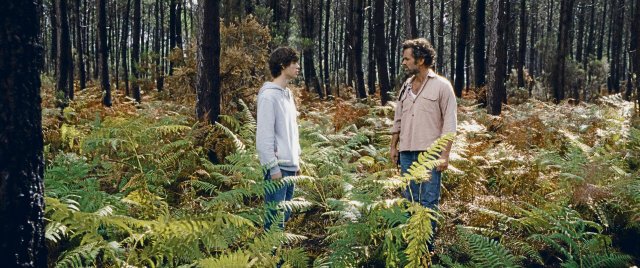Émile (Paul Kircher) and François (Romain Duris) go out and comb the forest in search of the missing mother.
Photo: Studiocanal/I. Matthew
When the young Émile (Paul Kircher) grows little claws under his bloody and painful fingernails, he panics. He realizes that he too is slowly starting to transform. Such mutations will be the order of the day in the near future in the arthouse science fiction film “Animalia” by director and screenwriter Thomas Cailley. The phenomenon is spreading faster and faster globally. Some people grow wings, others mutate into reptiles or giant insects or become idiosyncratic mammal hybrids. Émile’s mother is also affected by the spreading epidemic; she has already transformed into a hairy creature somewhere between a bear, a fox and a wolf. Locked in a hospital room, she stares out the window and repeatedly tears deep marks into the walls with her claws. Her son and husband visit her regularly. But is she still approachable? Is she still the person she was before? When she is about to be moved to a newly established center for mutant creatures in the south of France, her son Émile and father François (Romain Duris) move with her to Gascony and rent a holiday bungalow. But the transport with the mutated creatures crashes, dozens of them, including Émile’s mother, flee to freedom and hide in the woods.
“Animalia” tells of mutating hybrid creatures, as can recently be found in science fiction literature in the books of the successful French author Alain Damasio or in Dietmar Dath’s novels here. These fantasy creatures have also been haunting pop culture for decades, such as in the X-Men comic series, which has been filmed several times. In “Animalia,” however, no half-baked, pseudo-scientific explanations à la Hollywood are presented, but rather the phenomenon is presented in its social dimensions. While Émile tries to get along at the new school and develops a wonderfully strange romance with classmate Nina (Billie Blain), who has been diagnosed with ADHD, her father works a low-wage job in a restaurant. Nobody around her knows that Émile’s mother is one of those frightening creatures that have been making the area unsafe since the accident and are being hunted by angry citizens and the military. Because no one in the small town wants the monsters, the new treatment center for mutants behind huge concrete walls is regularly daubed with graffiti and vigilante groups are organizing themselves. Meanwhile, François and his son Émile go out and comb through the forest, which is closed to civilians, in search of the missing mother.
nd.DieWoche – our weekly newsletter

With our weekly newsletter nd.DieWoche look at the most important topics of the week and read them Highlights our Saturday edition on Friday. Get your free subscription here.
Where does a mutated creature end being human and where does its existence as an animal-hybrid creature begin? This question arises again and again in the film; the transitions are fluid and contested terrain. The changing Émile soon spends more time in the forest than with his father, who is dating policewoman Julia (Adèle Exarchopoulos). Despite its not exactly light content and topic, “Animalia” is an extremely fast-paced film with quick and sometimes very funny dialogues that describe student life, Émile’s relationship with his father and the romances of François and his son in their everyday life Fantastic let it become a part of it without it seeming artificial or contrived. With a budget of just 15 million euros, the film costs a tenth of what a comparable Hollywood production would have cost. But “Animalia” can absolutely keep up with the blockbusters of the fantasy genre despite the lack of high-end animation technology. The idiosyncratic mix of science fiction, body horror, art house, coming-of-age story, pandemic thriller and apocalyptic story has some almost poetic moments. For example, when father and son drive through the forest at night in the car with their mother’s favorite cheesy song turned up to maximum volume, shouting their names from the open windows and Émile shining a flashlight into the thicket of trees.
»Animalia« tells of magical crossings of boundaries, of fearful and cautious approaches to new, unknown ways of existing, of new abilities that seem fantastic to humans, such as flying and completely different hearing and smelling. This new freedom of beings who struggle with their fate and fight for their new existence and every hope, no matter how small, and who discover a whole new world for themselves, contrasts brutally with the constant threat from the state and society, with the violent obsession to control everything that is not. To lock away and eradicate the norms. Émile and his father also have to painfully experience how difficult it is to accept this new form of existence and to face it. This leads to disappointment, arguments and distortions, but also provokes solidarity, courage and love. That’s why Émile and François fight with great dedication.
»Animalia«, France 2023. Director: Thomas Cailley. With: Romain Duris, Paul Kircher, Adèle Exarchopoulos. 130 min. Cinema release: January 11th.
#ndstays – Get active and order a promotional package
Regardless of whether it is pubs, cafés, festivals or other meeting places – we want to become more visible and reach everyone who values independent journalism with an attitude. We have put together a campaign package with stickers, flyers, posters and buttons that you can use to get active and support your newspaper.
To the promotional package
